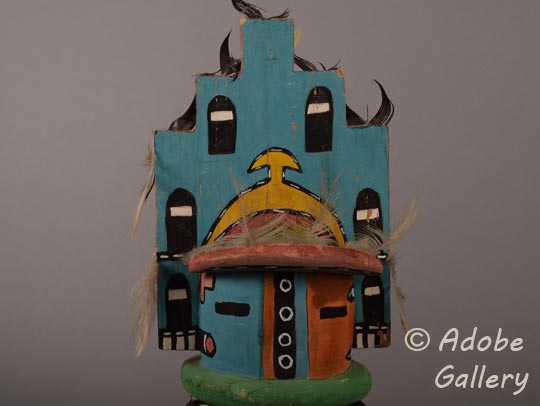Hopituh Shi-nu-mu Large Hemis Katsina Doll [SOLD]
+ Add to my watchlist Forward to Friend
- Category: Traditional
- Origin: Hopi Pueblo, Hopituh Shi-nu-mu
- Medium: wood, paint, feathers, yarn
- Size:
18-½” height x 6” width of tableta - Item # C4733A SOLD
This extraordinary Hopituh Shi-nu-mu (Hopi Pueblo) Hemis Katsina doll was carved by an unknown very talented artist. He is large, erect, proportioned, and beautifully painted. At over 18 inches, he is impressive. His body proportions are in scale to the size of the doll and the face covering is in the correct size to properly cover the head. The arms wrap around the midsection in the manner of early carvings, and the skirt or kilt hangs low over the legs like older carvings. The katsina doll stands unaided. It appears to date to the mid-1940s.
The mask and tableta were beautifully painted. The tableta is adorned with phallic symbols to indicate its fertility significance—fertility for crops, for animals, and for humans. An arched rainbow is painted on the tablita over the top of the head of the katsina. Below the mask is a carved green arrangement representing an evergreen ruff. The body of the katsina is painted with black corn smut with light colored half-moons on the chest and back.
The Hopi live in a desert and rely solely on rain for their crops and animals. It is to the katsinas that the Hopi plead for rain. In exchange for rain from the katsinas, the Hopi present them with pahos (prayer feathers). They do not ask for anything from the katsinas without giving something in return.
Although the Hemis Katsina may appear in any katsina dance, they are best known for their participation in the Niman Ceremony, a ceremony where many Hemis and Hemismana are the only katsinas represented. The Hemis Katsina is most frequently selected for the Niman because he is a beautiful impersonator, and his songs are popular with the Hopi.
The Niman or Home Ceremony performance, given shortly after the summer solstice, is the ceremony that closes the katsina season. The date of the Niman ceremony is set when the sun reaches its northernmost point.
It is interesting to note that at Hopi, they refer to the Hemis Katsina as having come from the Rio Grande Jemez Pueblo of New Mexico. At Jemez Pueblo, they refer to a similar dance as a Hopi dance.
Condition: very good
Provenance: this Hopituh Shi-nu-mu Large Hemis Katsina Doll is from a Santa Fe client of the gallery
Reference: Kachinas a Hopi Artist's Documentary by Barton Wright with original paintings by Cliff Bahnimptewa.
TAGS: Katsina Dolls, Hopi Pueblo, Hopi Kachina Dolls

- Category: Traditional
- Origin: Hopi Pueblo, Hopituh Shi-nu-mu
- Medium: wood, paint, feathers, yarn
- Size:
18-½” height x 6” width of tableta - Item # C4733A SOLD
Adobe Gallery Recommended Reading
Adobe Gallery Recommended Items
If you are interested in this item, we would also like to recommend these other related items:



